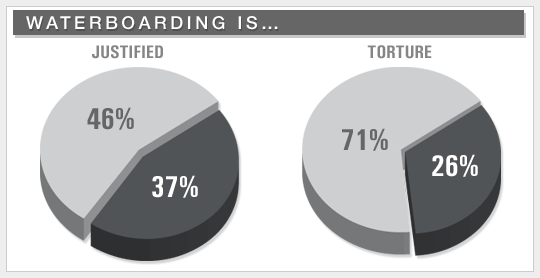Torture Creep?
The defense of torture as an extreme measure for extraordinary circumstances has evolved.tortu
Andrew Sullivan observes,
Remember the days when Republicans only defended torture in the case of a ticking time bomb? Funny how now the debate on the right has moved – so quickly and without any evidence – to defending torture as a permanent policy to find small nuggets of information that could help in developing leads in anti-terrorism work. Those of us who warned of such slippery slopes are vindicated. And that the capture and killing of Osama bin Laden should immediately prompt unfounded Republican celebrations of torture reveals how morally degraded the discourse has become after the despicable policies of Bush and Cheney.
While Andrew and I are on the same side on the torture issue, he’s mistaken in politicizing this. The truth of the matter is that he and I are in a distinct minority on this one.
- A 2005 AP-Ipsos poll found that 61 percent of Americans “agreed torture is justified at least on rare occasions.”
- An April 2009 CBS-NYT poll found 62 percent opposed to congress holding hearings on the Bush administration’s treatment of detainees. Indeed, the same poll found that, while 71 percent believed that waterboarding is torture, a 46 percent plurality thought it was justified! (See graphic at top.)
- A June 2009 AP-GfK poll found that support for torture had actually increased since their 2005 survey, with 52 percent saying “torture can be at least sometimes justified to obtain information about terrorist activities from suspects,” up from 39 percent four years earlier.
It’s true that Republicans are more supportive than Democrats. Partly, that’s a legitimate function of ideology. Mostly, though, it’s a function of supporting one’s team and the fact that a Republican administration had made the call to implement those policies.
But it’s fair to point out that, for all the Bush administration’s public bluster on the issue, the use of “enhanced interrogation” and all the rest was extremely limited–used only a handful of times and limited to the biggest targets–and had long since ceased as a tool by the time the Obama team took over. And, despite all of Obama’s bravado on the matter, he has kept the Bush policies he inherited intact. In some cases, he’s doubled down on them.
As I’ve noted many times over the years, I formed my attitudes on torture, prisoner treatment, and the like more than a quarter century ago as a Plebe at West Point. The teachings on the law of war and the code of conduct of professional soldiers were sacrosanct: It was simply a point of honor that warriors safeguarded non-combatants and adhered to the conventions, even at risk to themselves. How and why that ethic disappeared so quickly is a mystery to me. But it’s not a Republican/Democrat thing.







A large chunk of the US population never developed beyond a pre-conventional stage of morality. They percieve themselves as benefiting from torture so they’re for it. Any concern beyond the immediate practical one never enters most people’s heads.
James,
Placed in the proper context, I believe you would find a near universal revulsion for torture. However, the aversion to using it is proportional to what is a stake. For most people, if the situation is critical enough, there is no limit on what form a torture would be allowed.
The controversy surrounding waterboarding was a manufactured issue designed by liberals to place the Bush administration in a bad light. By doing so, they diminished the meaning of true torture and skewed the debate so that now when questions such as this are asked half the people are thinking one thing while the other half is thinking something else.
I think you are wrong here James. Those who avidly and publicly support torture are almost exclusively on the right. Those who oppose it are mixed, but those doing the research and writing the books tilt heavily to the left, with one exception, active duty and ex-military.
This is atopic not well understood by the general public. They mostly follow the lead of their elites. Thus, voters on the right are being lead by their pundits and ppls to support torture.
Steve
Since a Democratic majority of Congress (filibuster proof at one time) and Democratic President were unwilling or unable to pass a law specifically banning waterboarding, reason suggests that there is a broad majority in favor of it under limited circumstances (or at the very last the issue cuts across some important portion of the Democratic coalition).
That appears to be the exact policy the country has decided to take. Waterboarding is expressly off limits in the military; by executive order this policy is extended to the CIA, with the options for the President to lift the executive order or for the Attorney General expressly authorizes it.
When was it filibuster proof. I think we know how Lieberman would vote.
Steve
We’ve certainly seen Sullivan’s core observation in action on these pages in the last few days:
People who defended torture here framed it as an ongoing necessity, not as a rare necessity.
@PD
Or they decided it would be a political distraction.
“I think we know how Lieberman would vote.”
True; he and Ben Nelson voted against the bill that Bush vetoed. Link. OTOH, five Republican Senators voted for the bill and Lindsey Graham abstained. (I also wonder if McCain would have voted for the bill if he weren’t running in the primaries)
“Or they decided it would be a political distraction.”
I think it’s largely a political distraction because a complete ban on waterboarding isn’t popular. But I would agree that Obama executive order, largely made this a non-issue in the public’s eyes.
I’ll just state that it’s disappointing to me personally that Dr. Joyner, who I’ve come to regard highly, refuses to recognize the overwhelming endorsement of torture by the rank and file of the Republican Party, instead choosing to play the “both sides do it” game.
Oh well.
Sullivan, meanwhile, makes a legitimate point. Nobody on the right is using the “ticking time bomb” scenario to justify their enthusiasm for torture anymore. The ticking time bomb was always just a rationalization to get their foot in the door. Many of us saw that coming.
I’ll never forgive the man for that. Obama, even more than bush is responsible for us being a now objectively pro-torture country. Prior to him we at least had one party fighting against it but when he became defacto leader of the dems that sealed the deal.
Bastard.
The problem is an awful lot of the left is right there with them cheering on torture. It reall is both sides doing it.
And what is the definition of torture? “Torture” can mean many different things to different people.
SH: Anything I can do to you that will get you to say anything I want you to say…. or in case you don’t know what I want you to say, anything you think I want you to say. And believe me, I can be inventive. As the Afghans say: “You may have all the watches, but I have all the time.”
This seems like a good time to point out that both Kobe Bryant and I play basketball.
Or unable to pass a law against speeding.
Wait, speeding, like waterboarding, is already illegal under US law. Should we pass a law making it double double illegal?
John Yoo applauds such rationale.
Now “a handfull” includes over 300 times. And that’s just the number your president’s administration was willing to admit too.
Torture creep? Or reality creep? And this BS is from the supposed “reasonable conservative”.
Creep indeed.
Part of the problem is that we have people who can’t even acknowledge reality…of course waterboarding is torture…delusion and creep are a bad combination…
Not good enough. Without a standard definition of torture, any survey would be meaningless.
There is a lot of dissonance here- so let’s simplify- either torture is acceptable or not= it is one of those rare instances that it is black or white- we have to look into ourselves apart from outsides niceties- some may try to caliber it but we truly know what it is-perhaps because of my liberal bent= it is an easy call- but to suggest that the Senate approves due to the fact that senators representing maybe 20% of the population leads to a national conclusion is a stretch= the same as to polls- do people really know what it is? Should we incorporate it to law and order?
I think Sullivan’s argument is the telling one, and points to great dangers moving forward. The ‘rare occasions’ mentioned above are not specified and, for those on the right, have now moved from being a ‘ticking time bomb’ scenario to, well, whatever the apologists deem important enough.
The problem here is that once you justify torture for your side, the other side gets to justify it too, and the slope just keeps getting slippier for everyone.
For those whole ask, but do not bother to Google, here is that legal definition:
http://www.law.cornell.edu/uscode/718/usc_sec_18_00002340—-000-.html
Hat tip to Jay Tea.
Article 1 of the Convention defines torture as:
Ben, that treaty is trumped by the law mattb cited (from me — thanks, matt!). Treaties cannot circumvent US law.
And the US legal definition is a bit tighter than that one.
DaveBo, you say “300 times.” I say “against only three individuals.”
A significant distinction to me. Your count is like arresting a guy for beating up another guy, and charging him separately for assault for every single individual punch or kick.
J.
James, I had far too much to say to put in a comment, so I used your piece as a jumping-off point for a posting of my own. Thanks for the inspiration.
J.
Jay,
Article VI of the constitution states treaties entered into by the United States shall be “. . . the supreme law of the land.”
Domestic laws by definition cannot supercede the Convention Against Torture.
Incorrect.
What works, doesn’t need defending.
It;s called “reality”.
Look into it.
A further thought on Obama: here is a man that exhibits a dangerous moral ambivilance; he organizes, authorizes and avidly tries to watch in real time the assasination of ben Laden by a bullet in the face, yet he professes to loathe the waterboarding and other extrodinary interrogation methods used to help find UBL in the first place, even though waterboarding as a form of torture leaves the victim physically undamaged. A bullet in the face represents the ultimate physical damage one can do to a human being.